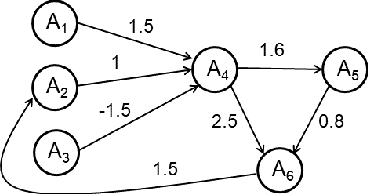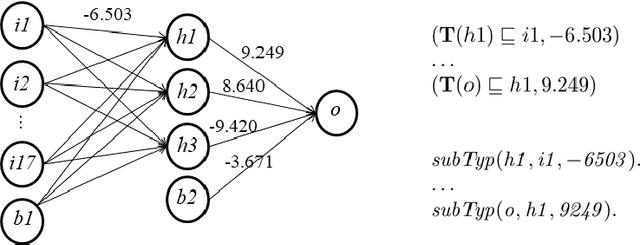Daniele Theseider Dupré
DISIT, Università del Piemonte Orientale, Italy
A framework for Conditional Reasoning in Answer Set Programming
Jun 04, 2025Abstract:In this paper we introduce a Conditional Answer Set Programming framework (Conditional ASP) for the definition of conditional extensions of Answer Set Programming (ASP). The approach builds on a conditional logic with typicality, and on the combination of a conditional knowledge base with an ASP program, and allows for conditional reasoning over the answer sets of the program. The formalism relies on a multi-preferential semantics (and on the KLM preferential semantics, as a special case) to provide an interpretation of conditionals.
A preferential interpretation of MultiLayer Perceptrons in a conditional logic with typicality
May 11, 2023Abstract:In this paper we investigate the relationships between a multipreferential semantics for defeasible reasoning in knowledge representation and a multilayer neural network model. Weighted knowledge bases for a simple description logic with typicality are considered under a (many-valued) ``concept-wise" multipreference semantics. The semantics is used to provide a preferential interpretation of MultiLayer Perceptrons (MLPs). A model checking and an entailment based approach are exploited in the verification of conditional properties of MLPs.
Complexity and scalability of defeasible reasoning in 1 many-valued weighted knowledge bases
Mar 08, 2023Abstract:Weighted knowledge bases for description logics with typicality under a "concept-wise'' multi-preferential semantics provide a logical interpretation of MultiLayer Perceptrons. In this context, Answer Set Programming (ASP) has been shown to be suitable for addressing defeasible reasoning in the finitely many-valued case, providing a $\Pi^p_2$ upper bound on the complexity of the problem, nonetheless leaving unknown the exact complexity and only providing a proof-of-concept implementation. This paper fulfils the lack by providing a $P^{NP[log]}$-completeness result and new ASP encodings that deal with weighted knowledge bases with large search spaces.
Many-valued Argumentation, Conditionals and a Probabilistic Semantics for Gradual Argumentation
Dec 14, 2022
Abstract:In this paper we propose a general approach to define a many-valued preferential interpretation of gradual argumentation semantics. The approach allows for conditional reasoning over arguments and boolean combination of arguments, with respect to a class of gradual semantics, through the verification of graded (strict or defeasible) implications over a preferential interpretation. As a proof of concept, in the finitely-valued case, an Answer set Programming approach is proposed for conditional reasoning in a many-valued argumentation semantics of weighted argumentation graphs. The paper also develops and discusses a probabilistic semantics for gradual argumentation, which builds on the many-valued conditional semantics.
An ASP approach for reasoning on neural networks under a finitely many-valued semantics for weighted conditional knowledge bases
Feb 02, 2022
Abstract:Weighted knowledge bases for description logics with typicality have been recently considered under a "concept-wise" multipreference semantics (in both the two-valued and fuzzy case), as the basis of a logical semantics of MultiLayer Perceptrons (MLPs). In this paper we consider weighted conditional ALC knowledge bases with typicality in the finitely many-valued case, through three different semantic constructions, based on coherent, faithful and phi-coherent interpretations. For the boolean fragment LC of ALC we exploit ASP and "asprin" for reasoning with the concept-wise multipreference entailment under a phi-coherent semantics, suitable to characterize the stationary states of MLPs. As a proof of concept, we experiment the proposed approach for checking properties of trained MLPs.
Weighted Conditional EL{^}bot Knowledge Bases with Integer Weights: an ASP Approach
Sep 17, 2021Abstract:Weighted knowledge bases for description logics with typicality have been recently considered under a "concept-wise" multipreference semantics (in both the two-valued and fuzzy case), as the basis of a logical semantics of Multilayer Perceptrons. In this paper we consider weighted conditional EL^bot knowledge bases in the two-valued case, and exploit ASP and asprin for encoding concept-wise multipreference entailment for weighted KBs with integer weights.
* In Proceedings ICLP 2021, arXiv:2109.07914. arXiv admin note: text overlap with arXiv:2012.13421
Reasoning about actions with EL ontologies with temporal answer sets
Jul 18, 2021Abstract:We propose an approach based on Answer Set Programming for reasoning about actions with domain descriptions including ontological knowledge, expressed in the lightweight description logic EL^\bot. We consider a temporal action theory, which allows for non-deterministic actions and causal rules to deal with ramifications, and whose extensions are defined by temporal answer sets. We provide conditions under which action consistency can be guaranteed with respect to an ontology, by a polynomial encoding of an action theory extended with an EL^\bot knowledge base (in normal form) into a temporal action theory.
From Common Sense Reasoning to Neural Network Models through Multiple Preferences: an overview
Jul 10, 2021Abstract:In this paper we discuss the relationships between conditional and preferential logics and neural network models, based on a multi-preferential semantics. We propose a concept-wise multipreference semantics, recently introduced for defeasible description logics to take into account preferences with respect to different concepts, as a tool for providing a semantic interpretation to neural network models. This approach has been explored both for unsupervised neural network models (Self-Organising Maps) and for supervised ones (Multilayer Perceptrons), and we expect that the same approach might be extended to other neural network models. It allows for logical properties of the network to be checked (by model checking) over an interpretation capturing the input-output behavior of the network. For Multilayer Perceptrons, the deep network itself can be regarded as a conditional knowledge base, in which synaptic connections correspond to weighted conditionals. The paper describes the general approach, through the cases of Self-Organising Maps and Multilayer Perceptrons, and discusses some open issues and perspectives.
A conditional, a fuzzy and a probabilistic interpretation of self-organising maps
Mar 11, 2021
Abstract:In this paper we establish a link between preferential semantics for description logics and self-organising maps, which have been proposed as possible candidates to explain the psychological mechanisms underlying category generalisation. In particular, we show that a concept-wise multipreference semantics, which takes into account preferences with respect to different concepts and has been recently proposed for defeasible description logics, can be used to to provide a logical interpretation of SOMs. We also provide a logical interpretation of SOMs in terms of a fuzzy description logic as well as a probabilistic account.
Weighted defeasible knowledge bases and a multipreference semantics for a deep neural network model
Jan 25, 2021Abstract:In this paper we investigate the relationships between a multipreferential semantics for defeasible reasoning in knowledge representation and a deep neural network model. Weighted knowledge bases for description logics are considered under a "concept-wise" multipreference semantics. The semantics is further extended to fuzzy interpretations and exploited to provide a preferential interpretation of Multilayer Perceptrons.
 Add to Chrome
Add to Chrome Add to Firefox
Add to Firefox Add to Edge
Add to Edge